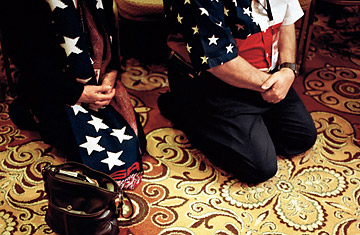
Convention attendees kneel in prayer at the National Tea Party Convention.
(4 of 6)
Is anyone organizing all this? Or trying to? Tom Jenney is the Arizona state director of a Washington-based group called Americans for Prosperity (AFP), a low-tax, libertarian advocacy group funded primarily by the wealthy Koch family of Wichita, Kans., and its foundations. With its sister organization FreedomWorks--run by former House majority leader Richard Armey--the AFP nurtured the Tea Party movement in its early days, offering training and logistical support. When Santelli sounded his trumpet, Jenney organized the first Tea Party protests in his state. But the larger the movement has become, the less sway professional organizers have, Jenney told Time. "We've done quite a bit of coaching. At the same time, a lot is self-done with these groups that are largely organized on the Internet," he said. "For example, the Tucson Tea Party folks are very independent. They have knocked out one city councilman and now want to recall the governor and two other city-council members." The old line about herding cats comes up repeatedly when Tea Partyers describe their movement. The Gadsden flag--DON'T TREAD ON ME--is an unofficial emblem. But hard as the movement is to pin down, certain strands of thought keep turning up when Tea Partyers gather.
The first is an explicit rejection of progressive philosophy. Until recently, progressivism was stowed on a dusty shelf of history, but many Democrats now embrace the label in place of the term liberal. It's an apt adoption. Like many Democrats today, the progressives of a century ago believed in the ability of social-science-minded intellectuals to analyze civic problems and engineer a way for government to tackle them. Tea Partyers say that belief, an integral part of the Obama team's mind-set, is crazy, even dangerous. They believe problems are better solved by individual efforts than through government programs. And they are suspicious that the real point of progressivism is not to solve problems but to concentrate power. No matter the crisis, whether it's a terrorist attack or a bank failure, they like to note, the government always gets bigger. "I'm not sure exactly why, but [Obama's] into this progressive movement," said Martin Michaels at an evening event in Rochester, N.Y. A silver-haired man dressed in biker gear and an unprintably anti-Obama T-shirt, Michaels added, "I don't think Obama's looking out for freedom, for the people."
